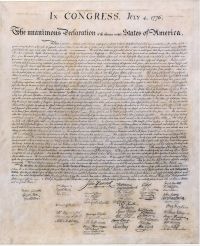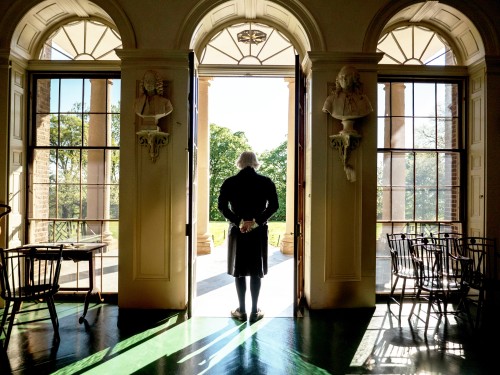 Before Americans were American, they were British. Before Americans governed themselves, they were governed by a distant British king and a British Parliament in which they had no vote. Before America was an independent state, it was a dependent colony. Before Americans expressed support for equality, their government and society were aristocratic and highly hierarchical. These transformations were complex, but the changes owe a great deal to the Declaration of Independence of 1776, what has been properly termed “America’s mission statement.”
Before Americans were American, they were British. Before Americans governed themselves, they were governed by a distant British king and a British Parliament in which they had no vote. Before America was an independent state, it was a dependent colony. Before Americans expressed support for equality, their government and society were aristocratic and highly hierarchical. These transformations were complex, but the changes owe a great deal to the Declaration of Independence of 1776, what has been properly termed “America’s mission statement.”
An American People
In its opening lines, the Declaration made a radical statement: America was “one People." On the eve of independence, however, the thirteen colonies had been separate provinces, and colonists' loyalties were to their individual colonies and the British Empire rather than to each other. In fact, only commercial and cultural ties with Britain served to unify the colonies. Yet the Declaration helped to transform South Carolinians, Virginians, New Yorkers and other colonists into Americans.
A New System of Governance
The Declaration announced America's separation from one of the world's most powerful empires: Britain. Parliament's taxes imposed without American representation, along with King George III's failure to address or ease his subjects' grievances, made dissolving the "bands which have connected them" not just a choice, but an urgent necessity. As the Declaration made clear, the "long train of abuses and usurpations" and the tyranny exhibited "over these States" forced the colonists to "alter their former system of Government." In such circumstances, Jefferson explained that it was the people’s “right, it was their duty,” to throw off the repressive government. Under the new "system," Americans would govern themselves.
Closer to Europe
America did not secede from the British Empire to be alone in the world. Instead, the Declaration proclaimed that an independent America had assumed a "separate and equal station" with the other "powers of the earth." With this statement, America sought to occupy an equal place with other modern European nations, including France, the Dutch Republic, Spain, and even Britain. America's independence signaled a fundamental change: once-dependent British colonies became independent states that could make war, create alliances with foreign nations, and engage freely in commerce.
Equal Rights
The Declaration proclaimed a landmark principle—that "all men are created equal." Colonists had always seen themselves as equal to their British cousins and entitled to the same liberties. But when Parliament passed laws that violated colonists' "inalienable rights" and ruled the American colonies without the "consent of the governed," colonists concluded that as a colonial master Britain was the land of tyranny, not freedom. The Declaration sought to restore equal rights by rejecting Britain's oppression.
The "Spirit of 76"
The principles outlined in the Declaration of Independence promised to lead America—and other nations on the globe—into a new era of freedom. The revolution begun by Americans on July 4, 1776 would never end. It would inspire all peoples living under the burden of oppression and ignorance to open their eyes to the rights of mankind, to overturn the power of tyrants, and to declare the triumph of equality over inequality.
Thomas Jefferson recognized as much, preparing a letter for the fiftieth anniversary of the adoption of the Declaration less than two weeks before his death, he expressed his belief that the Declaration
be to the world what I believe it will be, (to some parts sooner, to others later, but finally to all.) the Signal of arousing men to burst the chains, under which Monkish ignorance and superstition had persuaded them to bind themselves, and to assume the blessings & security of self government. the form which we have substituted restores the free right to the unbounded exercise of reason and freedom of opinion. all eyes are opened, or opening to the rights of man. the general spread of the light of science has already laid open to every view the palpable truth that the mass of mankind has not been born, with saddles on their backs, nor a favored few booted and spurred, ready to ride them legitimately, by the grace of god. these are grounds of hope for others. for ourselves let the annual return of this day, for ever refresh our recollections of these rights and an undiminished devotion to them.
--Thomas Jefferson to Roger Chew Weightman, June 24, 1826.

